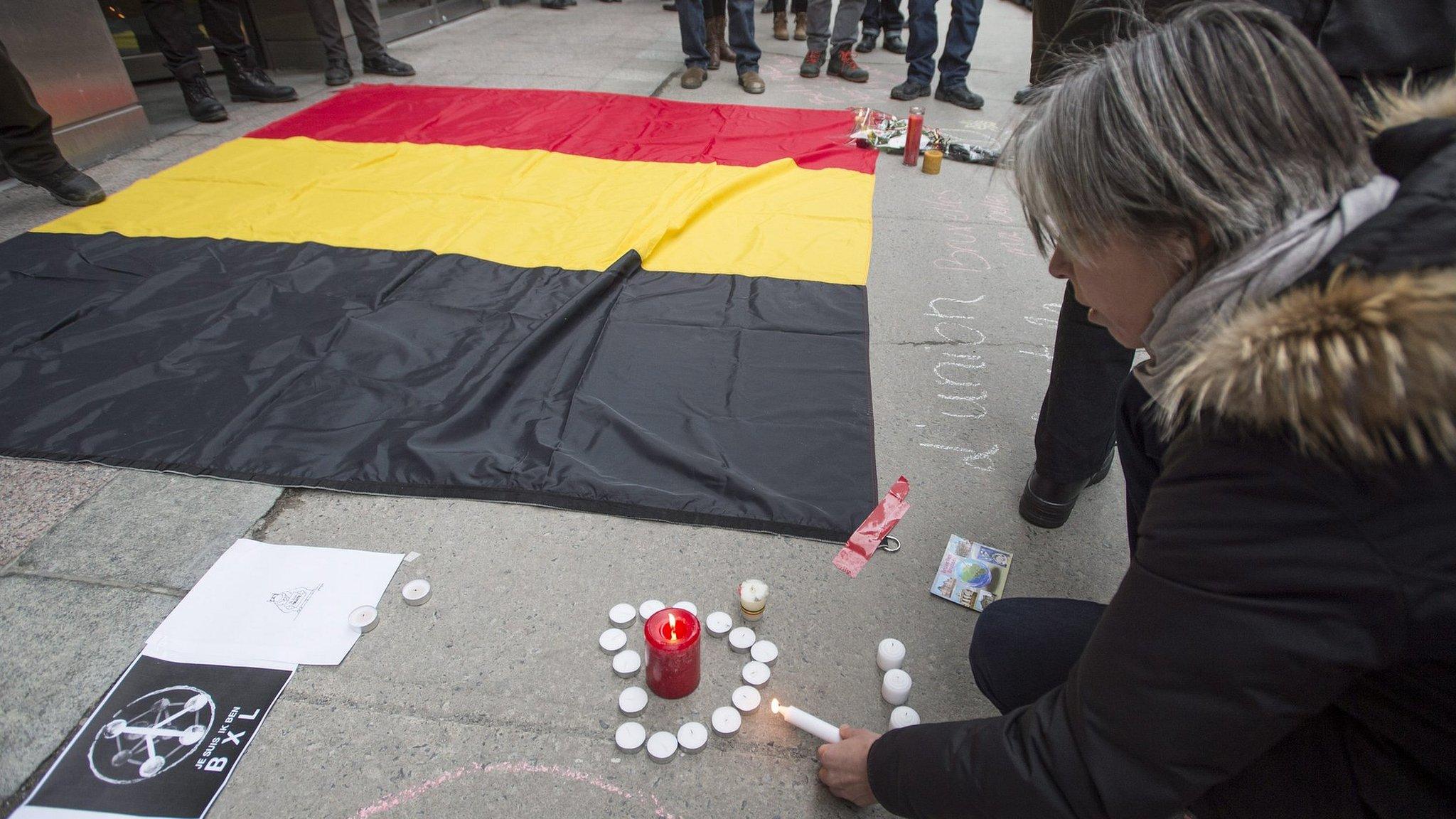Brussels explosions: UK Foreign Office urges Britons to be vigilant
- Published
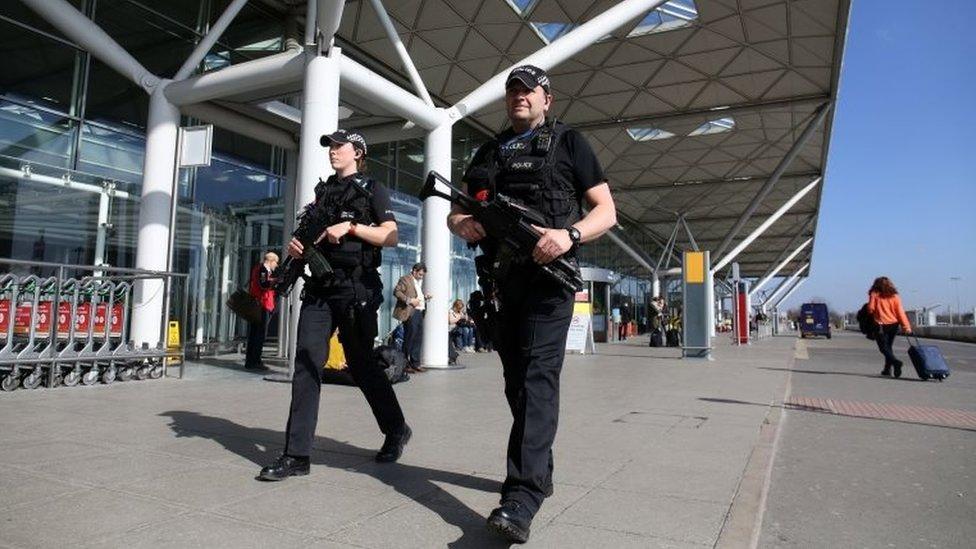
Officers are carrying out high-visibility patrols at UK airports among other places
The Foreign Office is warning Britons travelling to Brussels to be "alert and vigilant" after the deadly attacks on the city's airport and metro.
Two British nationals were among the injured, a spokesman confirmed.
There are also concerns for David Dixon, an IT programmer from Nottingham, whose family said had not been seen since the attacks.
Friends said Mr Dixon has lived in Brussels for 10 years with his partner and their young son.
He travelled to work every day on the city's Metro, but has not answered his phone or made contact since the explosions. His partner Charlotte Sutcliffe spent the day driving from hospital to hospital in Brussels trying to find him.
Twin blasts hit Zaventem airport at about 07:00 GMT on Tuesday, with 11 people reported killed. Another explosion at Maelbeek metro station near EU headquarters an hour later left about 20 people dead.
Brussels police have issued a wanted notice for a man seen pushing a luggage trolley through the airport.
Security at ports, airports, Tube and major railway stations in the UK has been stepped up.
David Cameron condemned the attacks, which have been claimed by so-called Islamic State, and warned of "a very real terror threat" across Europe.
Specialist police from the UK have been sent to Brussels to help with the investigation. The prime minister will chair a second Cobra security meeting to determine the UK's response to the attacks on Wednesday morning.
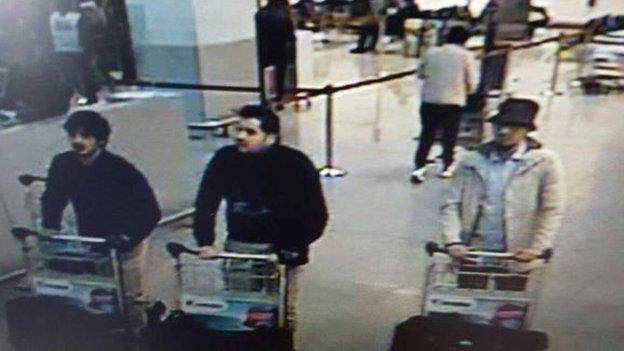
Police are hunting for the man pictured in the far right of this CCTV image of three suspected attackers
The Foreign Office said embassy staff were "providing consular assistance to two injured Britons and are ready to support any further British nationals that have been affected".
Britons in Brussels were told "to remain alert and vigilant, and stay away from crowded places".
An emergency number for those worried a relative may have been affected has been issued - 020 7008 0000.

More about the attacks

The UK's most senior counter-terrorism officer, Metropolitan Police Assistant Commissioner Mark Rowley, said increased police activity in the UK was a precaution and not in response to any specific threat.
In London, he said, the Met Police were putting more officers on duty to carry out patrols at key locations.
Home Secretary Theresa May said security checks at UK borders were being increased "to ensure public safety and provide public reassurance".
She told MPs there would be more searching of vehicles and greater use of search dogs.
The Belgian flag is being flown at half mast above Downing Street.
James Firkin was at Brussels airport when the blast happened
Mr Cameron chaired an emergency Cobra meeting to determine the UK's response to the attacks, and said Britain would do all it could to help the Belgian authorities.
"These are appalling and savage terrorist attacks and I've just spoken to the prime minister of Belgium to give our sympathies and our condolences to the Belgian people," Mr Cameron said.
"They could just as well be attacks in Britain or in France or Germany, or elsewhere in Europe and we need to stand together against these appalling terrorists and make sure they can never win."
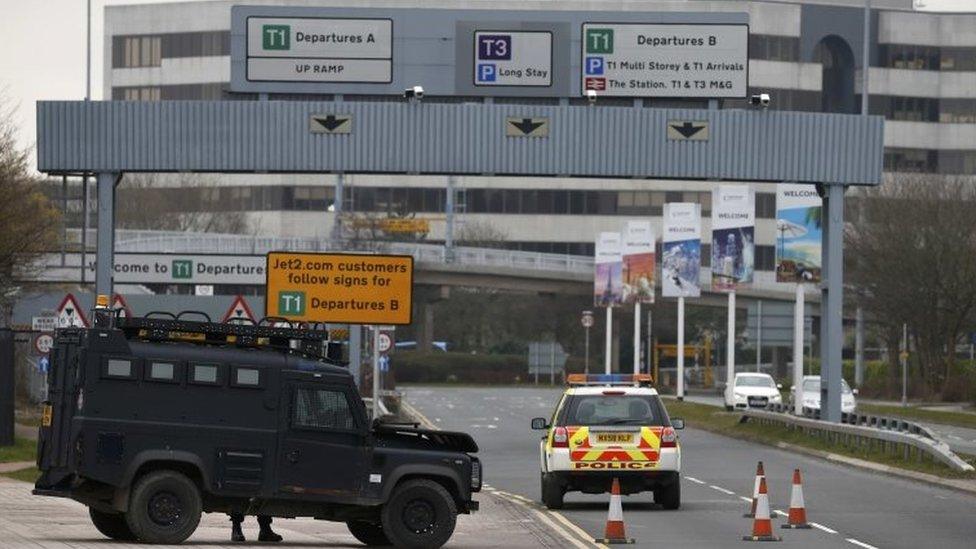
Greater Manchester Police says it has stepped up patrols, but there is no specific threat
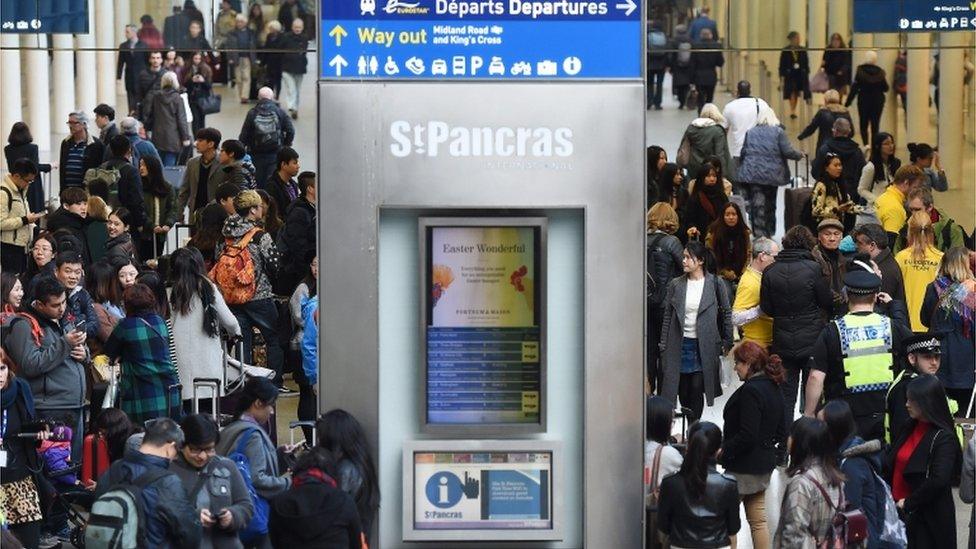
Eurostar trains from London St Pancras to Brussels Midi station have been cancelled, and extra patrols added at the UK's international train stations
Mr Cameron said UK authorities were continuing to review information coming in - and would raise the terror threat level if there was information of a direct threat.
The terror threat level has been at "severe" since August 2014, meaning an attack is highly likely.

Airport security in the spotlight
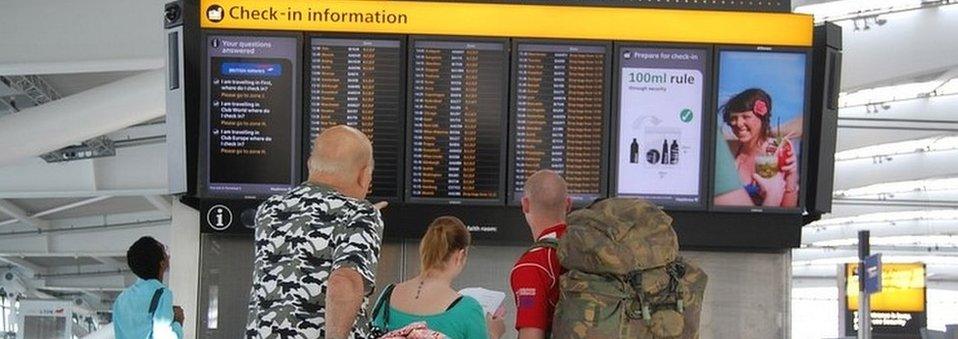
By BBC home affairs correspondent Tom Symonds
Airports are generally designed around a clear security "line" after which people pass into the "airside" area - in effect a security bubble. This protects the aircraft as much as the airport. The Brussels bombs were detonated outside the bubble, in the terminal before the security check.
Passengers will wonder why there are no security scanners at the door of the airport, or the entrance to the car park. Should we move the line of security?
The problem is that this simply moves the place where the queue forms. And queues are the ideal soft target for a terrorist.
Ben Gurion airport in Tel Aviv, often cited as the world's most secure, relies on profiling. Passengers are closely watched and intensively questioned about who they are and where they are going. Some experts swear by it, but it has been criticised as "politically incorrect".
Meanwhile, the UK government stresses the importance of good intelligence. But even if it was possible to fully protect air travellers, there are plenty of other places where crowds gather, which could be targeted instead.

The attacks come four days after Salah Abdeslam, a key suspect in the Paris attacks, was captured in Brussels.
The Belgian federal prosecutor said it was "probably a suicide bomber" who struck the airport.
Police in the UK have appealed for any British nationals who were in Brussels and may have images or footage of the incidents to come forward and assist the investigation.
They have set up a website where images and videos, external can be uploaded.
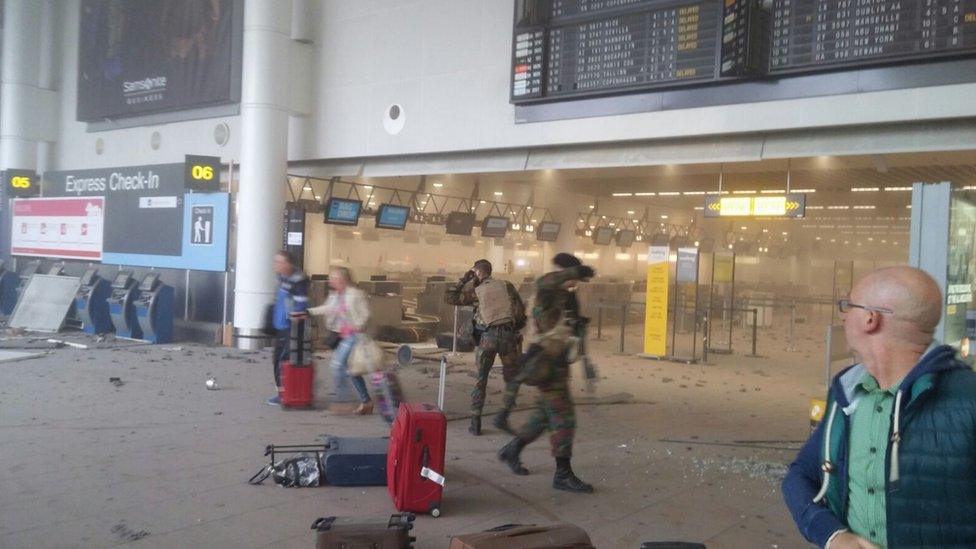
Security has been stepped up after the explosions
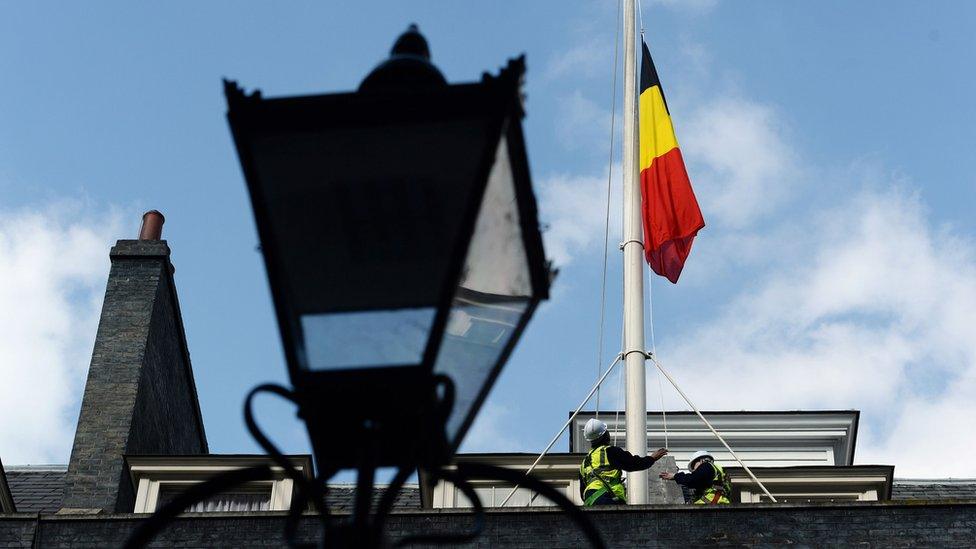
The Belgian flag is being flown at half mast above 10 Downing Street
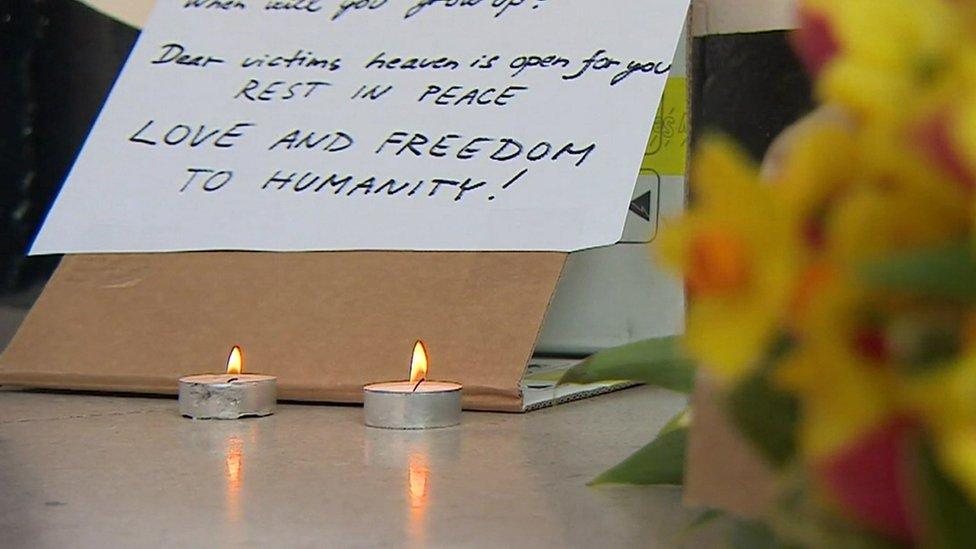
Tributes have been left outside the Belgian embassy in London
Cancelled flights
In the latest developments:
Brussels Airport said it would be closed on Wednesday, and officials would evaluate whether to resume operations on Thursday
Flights between the UK and Brussels are disrupted. Passengers are being advised to contact their travel operator
British Airways, external and Easyjet, external flights to Brussels have been cancelled on Wednesday while Ryanair , externalflights scheduled to operate to/from Zaventem airport will now operate to/from Brussels Charleroi airport
Brussels Airlines, external, which serves a number of UK airports, has cancelled its services to and from Brussels on Wednesday
Eurostar trains will operate a normal service on Wednesday, external but passengers are being asked to allow an hour to check in due to increased security checks. Those not wishing to travel can exchange tickets for free or claim a refund
The Port of Dover says security checks have remained heightened since November's attacks in Paris, with customers urged to leave extra time before travelling
- Published22 March 2016
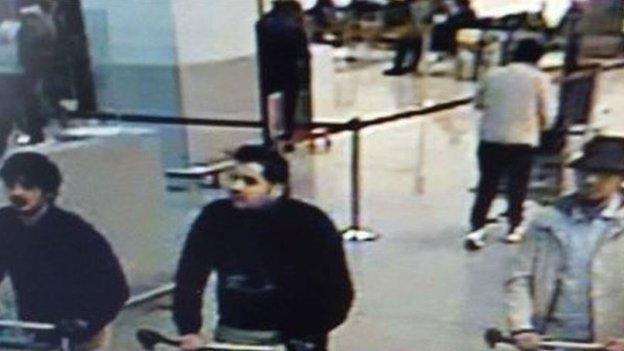
- Published22 March 2016
